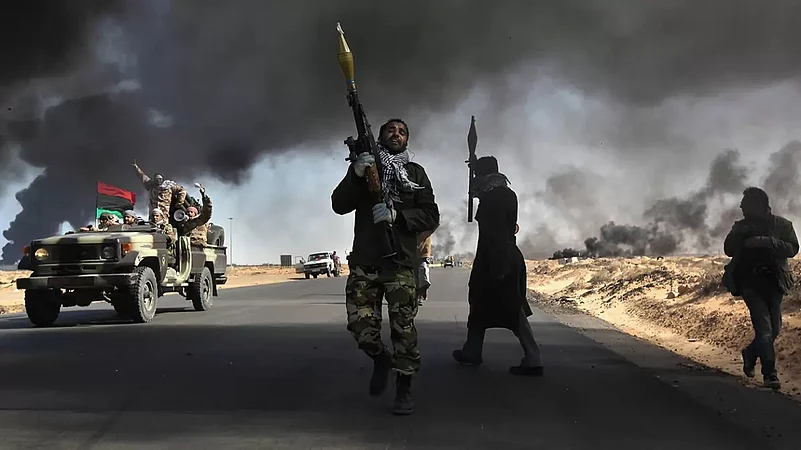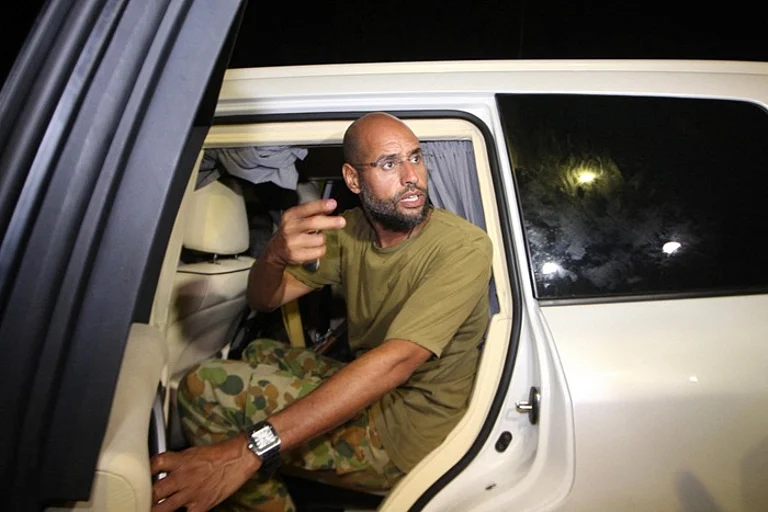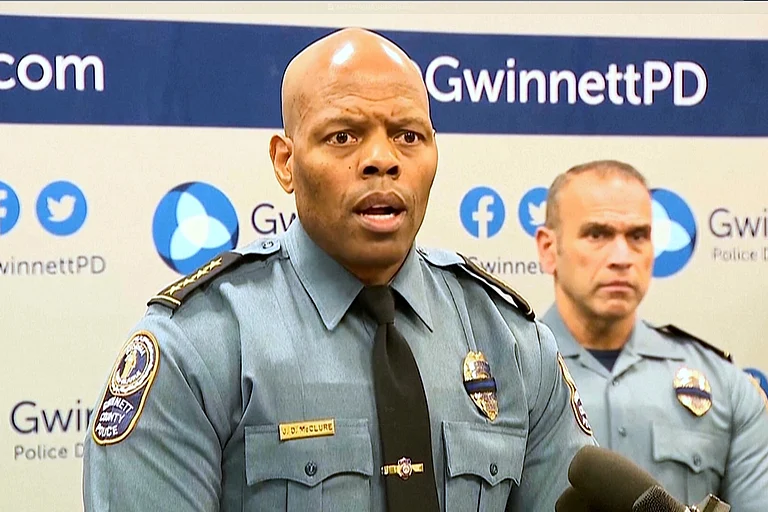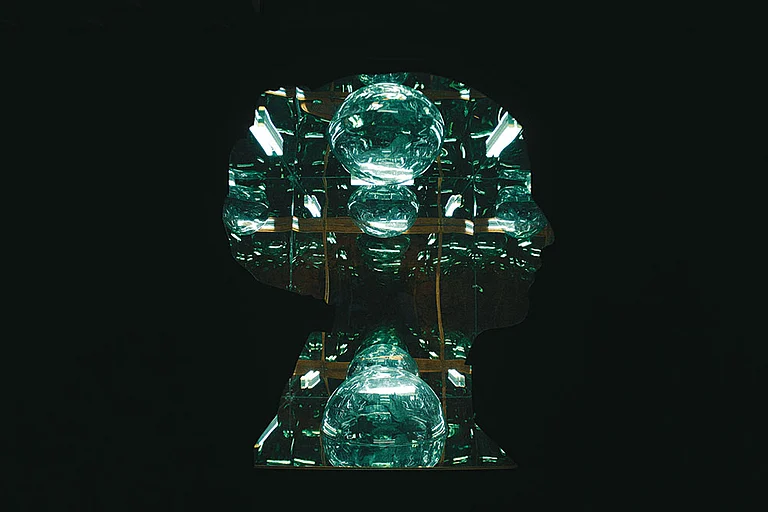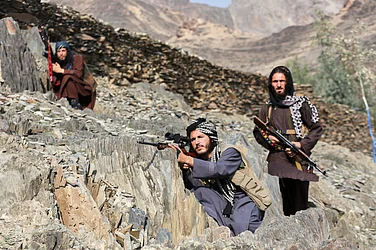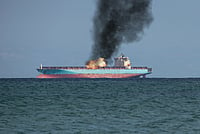In 2011, I was covering the Libyan revolution for the Associated Press (AP), where the Libyan rebels, with the help of NATO forces, fought to overthrow Colonel Gaddafi’s government.
I crossed into Libya through the Egyptian landport of Salloum, the main border point between Egypt and Libya. I spent the first night in Tubruk, a small coastal town in eastern Libya, before heading toward Benghazi. This was one of the best routes for foreign journalists to reach Benghazi as it was under the control of ‘journalist-friendly’ rebels. The rebels primarily comprised civilians, such as teachers, students, lawyers, businessmen, and oil workers, and a contingent of professional soldiers who had defected from the Libyan Army to join the rebels.
It was Saturday morning, April 9, 2011, when I along with other AP journalists finished our breakfast and were about to leave for the volatile frontline between Brega and Ajdabiya some 140 km from Benghazi, where we were based. Our routine was to head to the frontline in the morning, file from Ajdabiya and then head back to Benghazi by evening. I was travelling in one car and my colleagues were travelling in another. It was a pretty long drive from Benghazi that would take an hour and a half to reach the frontline as we drove along the coastal highway which was dotted with the remains of tanks and other military vehicles.
It was around 9 am when we reached the town of Ajdabiya, the last Libyan town held by the rebels in the east, some 80 km before the frontline. We crossed one of the many checkpoints manned by the rebels on the way to the frontline, which was at a gas station and a mosque that marked the halfway point between the Libyan towns of Brega and Ajdabiya.
I had told Ben, my photo colleague, that if any of us gets a chance to go further towards the frontline towards Brega, we should, and others could then move up with the cars. Ben asked me to let him know before I go ahead. We both agreed on this arrangement. Meanwhile, a rebel pickup truck came zooming from the frontline carrying a wounded Gaddafi loyalist whom the rebel forces had captured during the fight. We started taking pictures of the captured soldier.
At about 10 am, I saw some rebels loading Grad missiles onto a red pickup truck with a launcher mounted on the back. I thought I would take some photographs while they launched them towards the Gaddafi’s forces’ positions. The rebels looked familiar so I went ahead and asked them, mostly by sign language, if I could accompany them, and they agreed reluctantly.
I wanted to ensure a smooth ride through the checkpoint where a number of other journalists were waiting for an opportunity to move beyond that checkpoint. I thought I was lucky to pass that checkpoint disguised as a rebel and was about to photograph live action on the frontline. I am sure given a chance any journalist would have done the same.
The truck advanced for about a kilometre, then went off the road into the desert and behind a sand dune. There were three rebels in the truck, a driver and two riding at the back. The rebels fired four grad missiles, then drove back toward the main road to reload. They then returned behind the sand dune and fired two more rockets.
Suddenly, we came under heavy return fire. Panic broke. Shells, fired by brigades loyal to Gaddafi, started falling all around us. There was also heavy machine gun fire. A rebel and I jumped in the back of the truck. I was sitting right beneath the grad missile launcher. The rebels fired a third missile as they were speeding away, and the blast knocked me off. I fell on the sand with a thud.
I got up and tried chasing it, but the truck sped away. One of the rebels who was at the back looked at me and tried to tell the driver to stop, but they were too scared to stop even for two seconds ― apparently Gaddafi’s forces were closer to us than we had thought. The forces were using heavy machine guns as they were closing in. In a matter of seconds, I found myself deserted amid a rain of bullets and bombs.
I heard bullets whizzing through the air and hitting the sand while I was running for my life. I kept wondering why none of these bullets were hitting me. I rolled myself down a sand dune and ran back to the gas station, which was still about 300 metres away. By the time I got there, all the rebels and journalists had already fled, including my driver.
While running towards the gas station, I briefly looked back only to find Gaddafi’s forces, riding their pickup trucks and other military vehicles, firing heavy machine guns indiscriminately in the direction of the gas station.
As soon as I reached the gas station, I briefly paused at the door of the mosque just a few metres ahead and started thinking about where to hide. I thought there might be some rooms at the back as gas stations usually have bathrooms and toilets located behind the main building. So, I ran quickly behind the gas station and found three storerooms, a toilet, and a small dark room which probably was a kitchen. I stood there for a few seconds to decide which would be the best place to hide. I decided against hiding in any of those storerooms as they were easily accessible and had lots of light. The toilet was not a good option either as anyone could come there. My only option was that dark kitchen, which had a shattered tinted glass door.
The door was locked so I crawled into the room from under the shattered portion of the glass. It was a very small room, but dark to my advantage. It had been used as a kitchen before. There was a portable gas stove which I placed to block the shattered part of the door so no one could see me inside. All this while, gunshots and grenade blasts were drawing closer and closer.
Not long after, I heard Gaddafi’s forces rushing towards the back of the gas station hunting for rebels. They were going along the storerooms, kicking the doors and then firing their guns inside. I could visualise them searching every storeroom. They finished three rooms already, now it was the turn of the small room I was hiding in. I could hear the shattered pieces of the glass door being crushed under their boots as they walked towards that small room. I was sure they’d shoot me than ask for identification. I remembered my family, recited some prayers from the holy Quran, which are recommended in such situations, seeking Allah’s protection and help. I was very hopeful that my prayers would be answered. Unbelievably, they stopped just near the door, discussed something in Arabic for a few seconds and retreated to the front of the gas station without firing a single shot into the room. What a relief as they walked away. I took a deep breath and thanked Allah.
Now it was time to examine the place which was supposed to be my shelter for the rest of the day or may be even days. It was a very small room―probably 4x6 sq ft with a steel kitchen sink and a small window opening towards the storerooms and a huge wall. The room was stinking with rotten onion and human excrement in one corner, an empty plastic bottle and two steel plates. I found a piece of cloth which I put over the window to make the room even darker and to obstruct the view from outside. I took my compact camera and started filming the room, briefly. I disabled all the alarms and reminders from my mobile phone to ensure there’s no sound. I replaced my used camera flash cards with blank ones and hid the used ones in my boots.
The Gaddafi forces had taken over the gas station by then and were using it as a halt point. Rebels had left the power generator running at the gas station which made it a bit difficult for me to figure out what was exactly happening in the front. But it wasn’t difficult to guess that heavy military vehicles were moving towards the town of Ajdabiya, the last Libyan town under the control of rebels. That meant that I was in effect behind ‘enemy’ lines. It was later known to me that Gaddafi’s forces had attacked Ajdabiya from three directions, including the southern desert and two western roads.
At sundown, I heard forces talking and then getting into their vehicles and driving off to the east, towards Ajdabiya. I decided to stay in the room until dusk. By then, all was quiet. I crawled out of the room and peeked from the corner of the gas station.
I didn’t see anyone there. I explored those storerooms which were raided by the forces earlier in the day. Interestingly, I saw a group of newly-built houses, through a steel mesh window of one of the storerooms, at a distance in the desert. I thought it would be a good idea to stay in one of them, after dark. I went back inside the room and waited for some more time. When it was dark enough, I ran away from the room towards this group of newly-built houses. I decided to stay in the middle one to be safer.
As I entered, it was pitch-dark. I was afraid that I might run into the forces. I had a small flashlight attached to the zipper of my jacket, which I had bought from Afghanistan during an assignment there a few months ago. I was very careful while using the light as it could attract the attention of the passing military. I started exploring the house. It had four rooms, a kitchen, and two bathrooms fitted with bathtubs, but it seemed that the construction was still not over. I checked every room and found nothing until I went to the fifth room. There were two mattresses, two pillows, and a blanket. It appeared that fighters from one of the sides had squatted in the house. There were empty bottles, empty cigarette packets and food wrappers scattered around. I considered myself very lucky.
I started contemplating my next course of action. I thought of making my way back to Benghazi ―which was more than 150 km from this place― in the cover of darkness, but that seemed foolhardy since I could be mistaken for an enemy by either of the two sides and, moreover, walking such a distance in the desert at night was crazy. I could hear heavy military vehicles and tanks moving towards Ajdabiya. I decided to stay put unless there was a real opportunity. It was perhaps the loneliest night of my life. I fell asleep at about 1 am, but the intermittent sound of NATO aircraft on reconnaissance missions disturbed my sleep. A loud bang woke me up at around 5 am.
The house I had taken shelter had many windows, but two windows were at strategic positions ― one opening towards the gas station and the other towards the highway. I could see what Gaddafi’s forces were doing at the gas station and kept track of vehicles that were coming from or going towards Ajdabiya. I witnessed at least eight airstrikes, in the first half of the day, from the window opening towards the gas station, all behind a sand dune on the other side of the road. The whole house used to shake during the air strikes.
For about 45 minutes in the early afternoon, there were airstrikes again in the direction of Ajdabiya. Within no time, many vehicles started rushing back from Ajdabiya towards Brega. It looked as if Gaddafi’s forces were retreating hastily. At around 4 pm, the area was quiet. Vehicle movement on both sides ceased completely. At 5 pm, I saw normal pickup trucks arriving from Ajdabiya at the gas station, some of them with the rebel flag. It looked like they were rebel trucks captured by the Gaddafi forces.
One of the trucks drove near the house I was in. I heard it park; my heart sank. Then I heard men talking outside and someone opened the front door. I stood in the corridor just in front of the closed door, holding my cameras up so the man would see them before reaching for his gun. As soon as the man opened the door and saw me, I yelled “Sahafi… Sahafi...” (journalist in Arabic). He was dumbstruck. Before he could say anything, I started to communicate with him through sign language so that he could be sure that I was a foreign journalist and therefore no threat to him. He led me to the pick-up parked just outside the gate. As soon as I came out, the other armed men in the pick-up truck trained their guns on me. However, this man gestured that I was a journalist and not a threat. I gestured to him that I was thirsty and hungry. He gave me a cheese sandwich and an orange juice bottle while making me sit in the pickup. We drove to the gas station, some 200 metres away.
I thought the forces were not as barbaric as they were being portrayed. I couldn’t eat the sandwich due to my dry throat and maybe because I was nervous. I was holding my passport so that I could show it before their commander asked for it. When we reached the gas station, I saw a few men in uniform and some in civvies. None of them could speak English. They called their commander who was examining the gas station.
It appeared to me that everyone present there was surprised to see me alive in a place which was rocked by bombs and a gunfight a day before. When their commander, a short guy in civvies came, he shook my hand and asked how I was here and since when. He spoke good English and sounded tough as well.
While he was talking to me, I saw a man climb up on the mosque and hoist a rebel flag from its minaret. I was like, “Oh my God! They are rebels and I am saved.” I saw two rebels, whom I had seen many times before on the frontline, walk towards me. They hugged me and apparently recognised me. I felt completely different now. I was a free man, again!
After I was back, I noticed many of my friends had even started a page on Facebook: “Pray for the safe return of brother, Altaf Qadri, from Libya.” There were numerous emails and messages posted on my Facebook page. I felt so humble and thankful to have so many good friends and well-wishers around.
Others and I of my ilk have risked life and limb to bear witness and report from hostile zones with an aim to provide readers with a glimpse into the realities behind the headlines. We do this in the hope that we can bring change on the ground. Through photography, we capture slices of time, hoping to prompt understanding and connection. A powerful image has the potential to compel thought and inspire change. And this connection is what is fundamental to bringing about change on the ground.
Sadly, these days, more often than not, I’m left amazed and confounded. This is perhaps because, we, as journalists, go ―some may argue foolishly― into locations and situations where madness pervades the air. We leave our souls open to unimaginable haunting sights and hope that through our pictures and our reportage, the situation on the ground will change and something better will happen. Imagine our absolute despair when we come back and are shocked to find that nothing changes most of the times.
Mother Teresa once said, “I alone cannot change the world, but I can cast a stone across the waters to create many ripples.” This “I” is what brings meaning to my job as a photojournalist. As a banker, a doctor, a teacher, a chef, or an engineer, is there anything that you can do to change things on the ground for anyone? I absolutely hope so.
(Altaf Qadri is a photojournalist and visual storyteller.)






